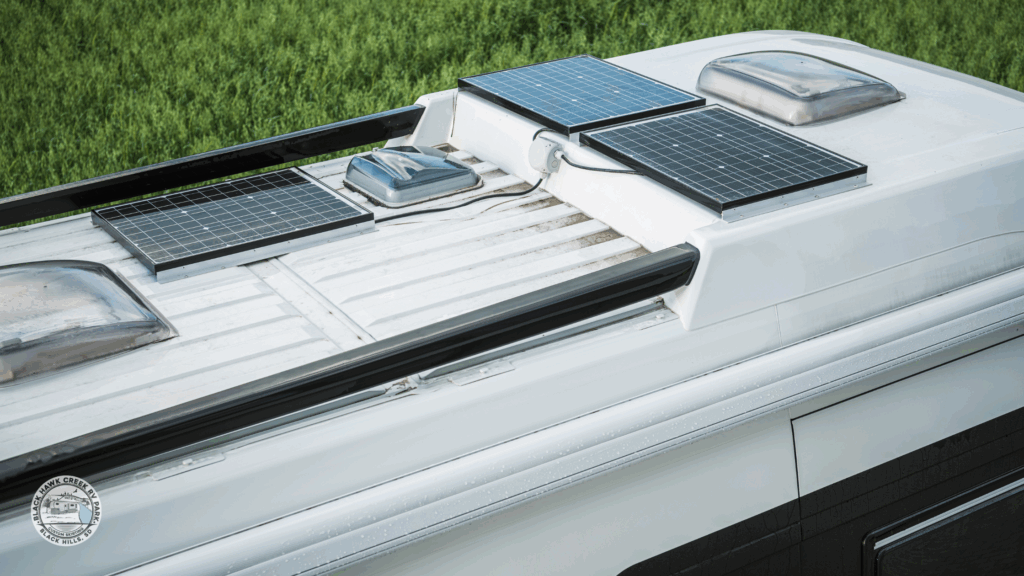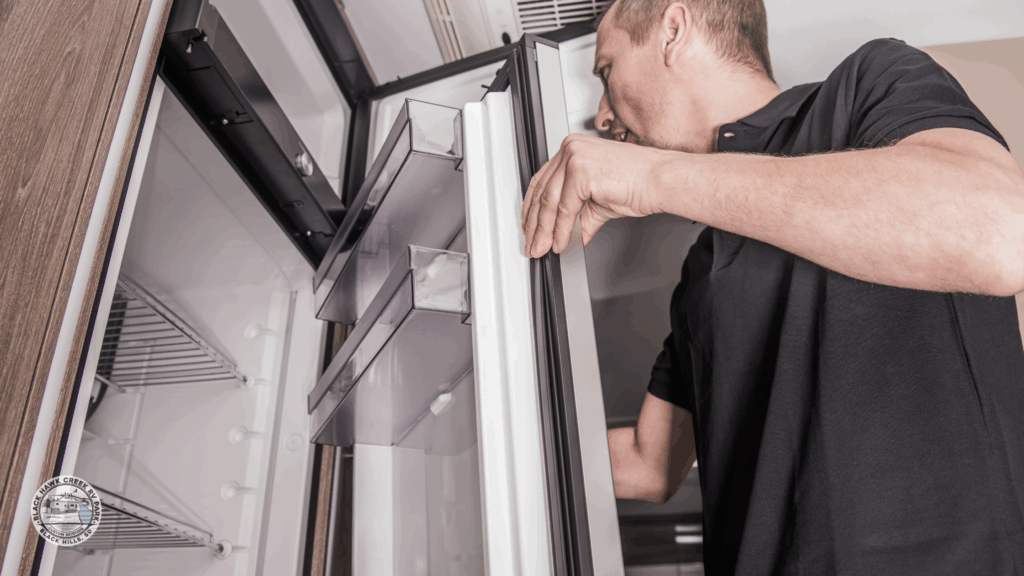Table of contents
If you’re a seasoned RVer or considering life on the road, one essential appliance you’ll need to understand is your RV refrigerator. So, how does an RV refrigerator work? How does an RV fridge work compared to the one in your home? And how do RV refrigerators work efficiently while bouncing down the road or parked off-grid? RV refrigerators differ significantly from standard residential fridges in terms of both operation and energy consumption. Understanding these differences is key to optimizing performance, preventing issues, and choosing the best fridge for your travel lifestyle. This guide explains how RV refrigerators work, including the different types, their operational mechanics, advantages, and what RV owners need to know to keep their systems running smoothly.
Let’s dive into the world of RV refrigeration and answer the crucial question: how does a RV refrigerator work?
Types of RV Refrigerators
Before diving into the technical workings, it’s important to understand the different types of RV refrigerators available. Knowing which type you have or want will help you make better use of your fridge and ensure easier maintenance.
Two-Way Absorption Refrigerators
Two-way absorption refrigerators are among the most common types found in RVs. They operate on either AC electricity or propane gas, offering flexibility depending on your camping setup. When you’re plugged into shore power or running a generator, you can use AC mode. When boondocking or parked without electricity, propane becomes the power source.
These refrigerators typically range from 4 to 12 cubic feet in storage capacity. They’re relatively energy-efficient, especially in propane mode, and operate silently. However, they have slower cooling times compared to compressor models.
Three-Way Absorption Refrigerators
Three-way refrigerators offer even greater flexibility by running on AC power, propane, or 12V DC from your RV’s battery system. This makes them especially useful when driving, as they can use the battery’s 12V power to maintain temperature.
Use DC while in transit, propane when off-grid camping, and AC power when parked at a full-hookup campsite. This level of adaptability makes them a favorite among RVers who frequently alternate between travel, off-grid, and plugged-in camping.
Residential-Style Compressor Refrigerators
Increasingly popular in newer and larger RVs, residential-style compressor refrigerators operate similarly to home units. They use a compressor to pump refrigerant through coils, creating a cooling effect. These refrigerators generally offer larger storage capacity and superior cooling performance.
The trade-off is that they require consistent and significant electrical power, usually through an inverter system if you’re using battery power. While excellent for full-time RVers who often stay at RV parks with hookups, they can be challenging for boondocking unless paired with a robust solar setup.
How Absorption Refrigeration Works

Now that we’ve covered the types, let’s answer the big question: how does an RV refrigerator work—especially absorption models, which are the most common in RVs?
The Absorption Cooling Process
Absorption refrigerators use heat to trigger a chemical reaction that provides cooling—no compressor required. Here’s how it works:
- Heat Source: Either electricity or propane heats a solution of ammonia and water in the boiler.
- Ammonia Gas: The heated mixture separates, and the ammonia turns into gas.
- Condensation: The gas travels to a condenser, where it cools and becomes a liquid.
- Evaporation: It then moves to the evaporator and mixes with hydrogen gas, causing evaporation and absorbing heat from the refrigerator’s interior.
- Absorption: The ammonia returns to the absorber and dissolves back into the water, completing the cycle.
This continuous cycle maintains the cool temperature inside the fridge.
The Role of Gravity and Leveling
If you’ve ever wondered why RV fridges need to be level, it’s because absorption systems rely heavily on gravity. The circulation of the ammonia and water mixture depends on the RV being level, usually within a few degrees.
If your RV is too unlevel, the fluids may not flow properly, causing inefficient cooling or even permanent damage to the cooling unit. Using a leveling tool before turning on your fridge can save you costly repairs.
Advantages and Limitations
Advantages:
- Silent operation
- Can operate on multiple power sources
- Reliable with minimal moving parts
Limitations:
- Slower cooling compared to compressor models
- Sensitive to temperature and leveling
- Less efficient in hot climates
How Compressor Refrigeration Works in RVs
How does an RV fridge work when it’s a compressor-based unit? Let’s explore.
The Compression Cooling Cycle
Compressor fridges work by compressing and circulating refrigerant gas. Here’s the simplified process:
- Compressor: Pressurizes the refrigerant.
- Condenser: The gas releases heat and becomes liquid.
- Expansion Valve: The liquid refrigerant expands and cools.
- Evaporator: The cold refrigerant absorbs heat from inside the fridge.
This type of fridge is not dependent on being level and cools quickly and efficiently.
Power Requirements and Considerations
Compressor fridges typically need a consistent power source, often AC electricity. If running on DC battery power, an inverter is needed to convert 12V to 120V AC. This requires ample battery storage and, for off-grid use, solar panels or a generator.
For RVers with sufficient energy resources, compressor fridges are a great option due to their performance and reliability.
Advantages and Limitations
Advantages:
- Quick and consistent cooling
- Better temperature control
- Operates regardless of levelness
Limitations:
- Higher power consumption
- May produce some noise
- Requires more robust electrical systems
Power Management for RV Refrigerators

Proper power management ensures your RV refrigerator works efficiently across various scenarios.
Operating on Shore Power
When plugged into campground hookups, your RV refrigerator typically runs on AC power. Whether you’re using 30-amp or 50-amp service, you’ll need to manage your total electrical load. Larger fridges, especially residential-style ones, benefit from 50-amp service for reliable operation alongside other appliances.
Operating on Propane
Absorption fridges shine when powered by propane. It’s a reliable option for boondocking or dry camping. Just be sure to:
- Monitor propane levels
- Check for proper ventilation
- Use carbon monoxide detectors
Most modern RVs automatically switch from AC to propane when unplugged.
Battery and Solar Considerations
Running an RV fridge on battery alone is more feasible with smaller compressor models or efficient three-way absorption units. Here’s what to consider:
- Deep cycle batteries or lithium options
- A high-capacity inverter
- Solar panels for recharging
Combining these elements extends off-grid capabilities while keeping your food fresh.
Efficiency Tips and Troubleshooting
To get the most out of your RV fridge, apply these tips and be ready to address common problems.
Maximizing Cooling Efficiency
- Pre-cool fridge before a trip
- Don’t overload the interior
- Leave space for air circulation
- Use fans to improve airflow
- Park in shade to reduce heat
- Keep vents clean and unobstructed
These habits help maintain stable temperatures and reduce energy consumption.
Common Problems and Solutions
- Fridge not cooling: Check power source, fuses, or thermostat
- Frost buildup: Check door seals and avoid leaving the door open
- Propane mode not working: Inspect igniter, gas valve, or airflow
- Fridge only works on one power source: Circuit board or selector switch might be faulty
Regular maintenance—like cleaning burner tubes or inspecting seals—goes a long way in preventing costly repairs.
Understanding how does an RV refrigerator work, how does an RV fridge work under different conditions, and how do RV refrigerators work with various power setups helps you get the most out of your RV experience. Whether you rely on absorption refrigeration for its silent, propane-powered convenience or prefer the fast performance of a compressor fridge, knowing how does a RV refrigerator work empowers you to make informed decisions, troubleshoot with confidence, and travel without food storage worries.
Stay Powered Up and Cool at Black Hawk Creek RV Park
New to RVing and learning how your fridge system works? Make your transition easier with a stay at Black Hawk Creek RV Park. Our full-hookup sites offer reliable power and cold storage support—ideal for keeping your refrigerator running efficiently while you focus on exploring the stunning beauty and rich culture of the area. Whether you’re planning peaceful downtime or thrilling day trips, Black Hawk Creek is your perfect home base. Book your stay today and experience worry-free camping with all the comforts you need!

